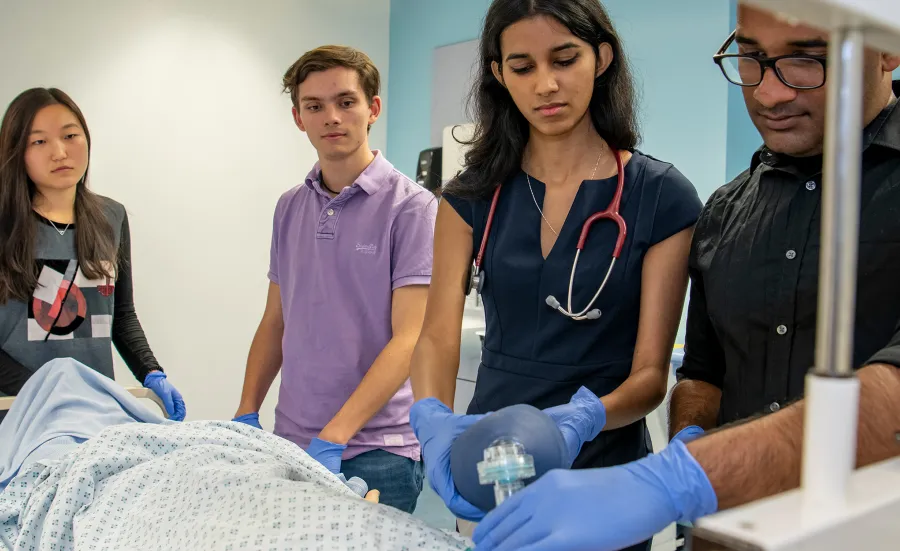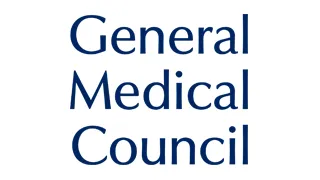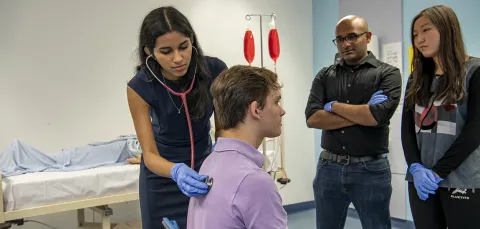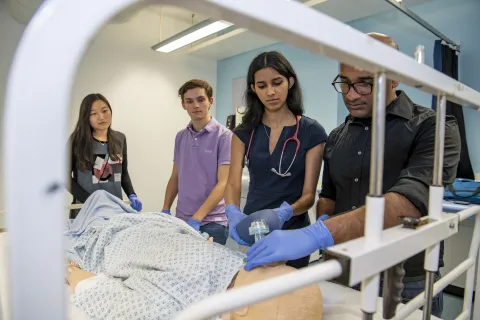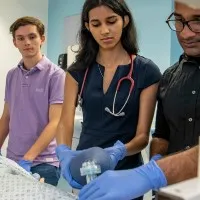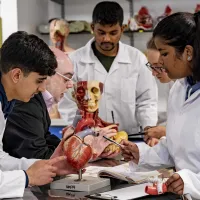About this course
This Bachelor of Medicine, Bachelor of Surgery (BMBS) Medicine BM5 degree offers you the chance to study medicine at Southampton General Hospital, a top UK teaching hospital. You'll also benefit from our purpose-built Life Sciences facilities on campus.
You'll start gaining clinical experience in the first few weeks of the course and apply your core learning in hospitals and primary care settings. You’ll become part of an integrated team of healthcare professionals who understand medicine in context – social, emotional, and physical.
Your year 3 placements will take place in partner trusts including Portsmouth, Winchester and Southampton. In the final 2 years of the course, your placement could be in a range of settings across the Wessex region. These include hospital trusts, GP surgeries, urgent care centres, the ambulance service and other third sector organisations in the community.
Research is embedded within our degrees. You'll learn from academics whose research has impacted patient care, from pandemic response to cancer therapies. You'll gain the essential research skills you'll need as a doctor. We also work with students as valued partners in the development of our courses.
As part of your medicine degree you'll:
- attend shifts as a healthcare support worker to experience multi-professional teamwork
- benefit from support from personal academic tutors, our faculty senior tutor team, peer support and mentoring
- explore topics that interest you in public, global and planetary health, as well as medical humanities
- take a student assistantship module in year 5 where you'll work as an apprentice FY1 doctor
- choose an elective, clinical placement, research or educational project in your final year
Between year 3 and year 4, you can apply to study for a Master of Medical Science or MSc at Southampton, or for an iBSc or MSc at another university (known as intercalation)
If you already have a degree, you may be able to apply for our 4-year medicine course instead.
We regularly review our courses to ensure and improve quality. This course may be revised as a result of this. Any revision will be balanced against the requirement that the student should receive the educational service expected. Find out why, when, and how we might make changes.
Our courses are regulated in England by the Office for Students (OfS).
Accreditations
Learn more about this subject area
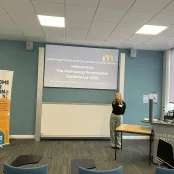
Southampton felt so collaborative and a place where students and staff helped each other, which is exactly what I wanted

My project helped me to better understand the Cardiothoracic field and how medicine is applied.

Studying medicine and co-founding an online health service lend themselves very nicely to one another. As I learn more in one, the knowledge is directly applicable to the other.
Course locations
This course is based at Highfield, University Hospital Southampton and Southampton City Centre.
Awarding body
This qualification is awarded by the University of Southampton.
Download the Course Description Document
The Course Description Document details your course overview, your course structure and how your course is taught and assessed.
Entry requirements
For Academic year 202627
Eligibility Criteria
Applicants must be 18 or over at the start of the course. Any applicant under 18, if given an offer post interview, will potentially be offered a deferred place.
BM5 is open to Home and International students. International applicants must meet the entry requirements for either a School Leaver, Graduate or Mature Non-Graduate through the listed or equivalent qualifications. International applicants will also have to meet the IELTS or equivalent requirement listed below.
All applicants must sit the UCAT test before the 15th October UCAS deadline. Applicants must take UCAT in the year they are applying.
All applicants must meet one of the below entry requirement combinations.
BM5 School Leaver applicants must meet the minimum standard A Level and GCSE entry requirements listed below.
Any BM5 Home (UK) School Leaver applicant who meets two of the University contextual admissions criteria will be considered for the contextual A Level entry requirement, please see below. Graduate, Mature Non-Graduate and International applicants are not eligible for a contextual offer. Contextual applicants have to meet the standard GCSE requirement.
BM5 Graduate applicants (to BM4 and BM5) need to achieve an Upper Second-Class Honours (2.1) in their first degree, this must be equivalent to a UK Honours degree. The degree can be in any subject and no preference will be given based on the degree subject taken. Please note we do not have any A Level requirements for graduate applicants. Please see below for Graduate GCSE requirements.
Applicants being considered as Mature Non-Graduate applicants must be over 21 years old at the point of submitting their application (15th October) and not hold a degree. Applicants must meet the standard A Level or equivalent entry requirement. Please see below for specific Mature Non-Graduate GCSE requirements.
A-levels
AAA to include A level Biology and one additional science (with a pass in the practical element where it is separately endorsed). Please note applicants must offer AAA or above, we do not accept grade or tariff equivalents to AAA. BM5 graduate applicants please see our BM4 entry requirements for additional graduate entry requirement information.
A-levels additional information
Acceptable science subjects are Chemistry, Physics, Psychology, Sociology, Environmental Studies or Geography. Offers typically exclude General Studies and Critical Thinking. Subjects where there may be considerable overlap of material will not be accepted in combination (examples of combinations include, but are not exclusive to, Zoology/Biology; Biology/Sports Studies/Physical Education). If you believe there is a potential overlap, please contact us before applying.
A-levels with Extended Project Qualification
For this programme we do not make an alternative offer, however we welcome applicants who have achieved a good grade in the EPQ
A-levels contextual offer
We are committed to ensuring that all students with the potential to succeed, regardless of their background, are encouraged to apply to study with us. The additional information gained through contextual data allows us to recognise a student’s potential to succeed in the context of their background and experience. Students who are highlighted in this way will be made an offer which is lower than the typical offer for that programme, as follows: AAB to include A level Biology and one additional science (with a pass in the practical element where it is separately endorsed).
BM5 Contextual offers only apply to School Leaver applicants. To be considered contextual School Leaver applicants need to meet two contextual flags in accordance with the University contextual admissions criteria.
International Baccalaureate Diploma
Overall score of 36 points with 18 at Higher Level, with 6 in Biology and one additional Science
International Baccalaureate Diploma additional information
Acceptable science subjects are Chemistry, Physics, Psychology, Sociology, Environmental Studies or Geography. Subjects where there may be considerable overlap of material will not be accepted in combination (examples of combinations include, but are not exclusive to, Zoology/Biology; Biology/Sports Studies/Physical Education). If you believe there is a potential overlap, please contact us before applying.
International Baccalaureate contextual offer
We are committed to ensuring that all learners with the potential to succeed, regardless of their background, are encouraged to apply to study with us. The additional information gained through contextual data allows us to recognise a learner’s potential to succeed in the context of their background and experience. Applicants who are highlighted in this way will be made an offer which is lower than the typical offer for that programme.
BTEC
RQF BTEC
AA from two A levels in Biology and one additional science and Pearson BTEC Level 3 National Extended Certificate (360 GLH) at Distinction. Applied Science is not accepted. Subject provided reviewed on a case by case basis. Subjects where there may be considerable overlap of material will not be accepted in combination (examples of combinations include, but are not exclusive to, Zoology/Biology; Biology/Sports Studies/Physical Education). If you believe there is a potential overlap, please contact us before applying.
We are committed to ensuring that all learners with the potential to succeed, regardless of their background, are encouraged to apply to study with us. The additional information gained through contextual data allows us to recognise a learner’s potential to succeed in the context of their background and experience. Applicants who are highlighted in this way will be made an offer which is lower than the typical offer for that programme.
Additional information
We do not accept the BTEC Diploma or Extended Diploma as a qualifications on their own, they must be offered in conjunction with the required Biology and Additional Science A Levels. BTEC Applied Science is not accepted for BM5.
QCF BTEC
AA from two A levels in Biology and one additional science and Pearson BTEC Level 3 National Extended Certificate (360 GLH) at Distinction. Applied Science is not accepted. Subject provided reviewed on a case by case basis. Subjects where there may be considerable overlap of material will not be accepted in combination (examples of combinations include, but are not exclusive to, Zoology/Biology; Biology/Sports Studies/Physical Education). If you believe there is a potential overlap, please contact us before applying.
BTEC contextual
We are committed to ensuring that all learners with the potential to succeed, regardless of their background, are encouraged to apply to study with us. The additional information gained through contextual data allows us to recognise a learner’s potential to succeed in the context of their background and experience. Applicants who are highlighted in this way will be made an offer which is lower than the typical offer for that programme.
Access to HE Diploma
Access to Medicine - May be accepted from approved institutions or with suitable scientific content. 60 credits with a minimum of 45 credits at Level 3 all of which must at Distinction.
Access to HE additional information
Access to HE Diploma (Medicine) will be accepted. Other access courses may be considered on a case by case basis, however, online access courses will not accepted. We would expect there to be a significant amount of time between the previous qualification (where relevant) and the Access to HE Diploma (Medicine) or alternative access course. We will not consider an application from an A Level student who undertakes an Access course shortly after completing their A Level but fails to achieve the required advertised A Level grades. Access courses are most likely to be considered for applicants who have not taken Science qualifications.
Access Offer Contextual
We are committed to ensuring that all learners with the potential to succeed, regardless of their background, are encouraged to apply to study with us. The additional information gained through contextual data allows us to recognise a learner’s potential to succeed in the context of their background and experience. Applicants who are highlighted in this way will be made an offer which is lower than the typical offer for that programme.
Irish Leaving Certificate
Irish Leaving Certificate (first awarded 2017)
H1 H1 H2 H2 H2 H2, with H2 in Biology and one additional science
Irish certificate additional information
Acceptable science subjects are Chemistry, Physics, Psychology, Sociology, Environmental Studies or Geography. Subjects where there may be considerable overlap of material will not be accepted in combination (examples of combinations include, but are not exclusive to, Zoology/Biology; Biology/Sports Studies/Physical Education). If you believe there is a potential overlap, please contact us before applying.
Irish Offer Contextual
We are committed to ensuring that all learners with the potential to succeed, regardless of their background, are encouraged to apply to study with us. The additional information gained through contextual data allows us to recognise a learner’s potential to succeed in the context of their background and experience. Applicants who are highlighted in this way will be made an offer which is lower than the typical offer for that programme.
Scottish Qualification
Offers will be based on exams being taken at the end of S6. Subjects taken and qualifications achieved in S5 will be reviewed. Careful consideration will be given to an individual’s academic achievement, taking in to account the context and circumstances of their pre-university education.
Please see the University of Southampton’s Curriculum for Excellence Scotland Statement (PDF) for further information. Applicants are advised to contact their Faculty Admissions Office for more information.
Cambridge Pre-U
D3 D3 D3, including Biology and one additional science
Cambridge Pre-U additional information
Acceptable science subjects are Chemistry, Physics, Psychology, Sociology, Environmental Studies or Geography. Subjects where there may be considerable overlap of material will not be accepted in combination (examples of combinations include, but are not exclusive to, Zoology/Biology; Biology/Sports Studies/Physical Education). If you believe there is a potential overlap, please contact us before applying.
Cambridge Pre-U Offer Contextual
We are committed to ensuring that all learners with the potential to succeed, regardless of their background, are encouraged to apply to study with us. The additional information gained through contextual data allows us to recognise a learner’s potential to succeed in the context of their background and experience. Applicants who are highlighted in this way will be made an offer which is lower than the typical offer for that programme.
Welsh Baccalaureate
AAA to include A level Biology and one additional science (with a pass in the practical element where it is separately endorsed) or AA from two A levels in including Biology and one additional science (with a pass in the practical element where it is separately endorsed) and grade A from the Advanced Skills Baccalaureate Wales.
Welsh Baccalaureate additional information
Acceptable science subjects are Chemistry, Physics, Psychology, Sociology, Environmental Studies or Geography. Subjects where there may be considerable overlap of material will not be accepted in combination (examples of combinations include, but are not exclusive to, Zoology/Biology; Biology/Sports Studies/Physical Education). If you believe there is a potential overlap, please contact us before applying.
Welsh Baccalaureate contextual offer
We are committed to ensuring that all learners with the potential to succeed, regardless of their background, are encouraged to apply to study with us. The additional information gained through contextual data allows us to recognise a learner’s potential to succeed in the context of their background and experience. Applicants who are highlighted in this way will be made an offer which is lower than the typical offer for that programme.
T-Level
T Level qualifications are not accepted for this course.
Other requirements
GCSE requirements
All applicants (Home and International) must meet the minimum GCSE requirement. If an International applicant has not taken GCSEs they must offer an equivalent qualification with comparable subjects and grades to those listed below.
BM5 (standard and contextual applicants) - applicants must hold 7 GSCEs at grade B/6 or above, including English language, mathematics and either biology and chemistry, combined science, or science and additional science.
BM5 Graduate applicants – Applicants must hold 4 GCSEs at grade C/4 or above, including English language, mathematics and either biology and chemistry, combined science, or science and additional science.
BM5 Mature Non-Graduate applicants- applicants must hold 4 GCSEs at grade C/4 or above, including English language, mathematics and either biology and chemistry, combined science, or science and additional science.
Find the equivalent international qualifications for our entry requirements.
English language requirements
If English is not your first language, you must show that you can use English to the level we require. Visit our English language pages to find out which qualifications we accept and how you can meet our requirements.
If you are taking the International English Language Testing System (IELTS), you must get at least the following scores:
IELTS score requirements
- overall score
- 7.0
- reading
- 7.0
- writing
- 7.0
- speaking
- 7.0
- listening
- 7.0
If you do not meet the English language requirements through a test or qualification, you may be able to meet them by completing one of our pre-sessional English programmes before your course starts.
You might meet our criteria in other ways. Find out more about our Admissions Policy.
Non-academic entry requirements
UCAT
All applicants must take the University clinical aptitude test (UCAT) prior to the 15th October medicine application deadline. Please visit ucat.ac.uk for further details about the test.
Selection to Interview
All applicants who meet the entry requirements through either achieved or predicted grades at the point of application are ranked by UCAT score and the top number of applicants invited to interview. Please see the ''How to apply'' tab for further interview details.
Non- academic Entry requirements
In addition to academic entry requirements, the selectors will look for evidence of non- academic criteria during the selection process.
At interview applicants must be able to show they;
• Are self -motivated and resilient
• Have reflected on and learnt from life experiences (this may include work experience, paid employment and personal experiences both in and outside health and social care settings)
• Can communicate effectively
• Are able to interact successfully with others
• Can demonstrate an understanding of the values of the NHS Constitution
Offers
Offers are made based on interview performance. UCAT will be used post interview if there is a tie between applicants selection day scores.
Additional Requirements
If you are offered a place after attending an interview you will need to meet the following conditions along with any academic requirements:
Certificates
Supply official copies of certificates for all completed qualifications listed in your offer.
Health Clearance
Occupational Health Completion and confirmation of a satisfactory health screening, including confirmation of appropriate vaccinations, will be a condition of all offers. All students must comply with the vaccination requirements of the programme which must be met in order to undertake placements. The list of vaccinations required is updated by the NHS and may change over the course of your programme.
DBS
All incoming students will be subject to an enhanced Disclosure and Barring Service Check (DBS) as part of the induction process. This is a legal requirement for those involved in contact with children or vulnerable adults.
Got a question?
Please contact our enquiries team if you're not sure that you have the right experience or qualifications to get onto this course.
Email: enquiries@southampton.ac.uk
Tel: +44(0)23 8059 5000
Course structure
This 5-year course is split into 4 phases:
- the fundamentals of medicine
- progression into clinical practice
- developing clinical practice
- preparing for independent practice
You'll gain clinical experience throughout. This may involve some weekend and evening working.
You must pass all the course modules to progress to the next stage and graduate. Although there are no optional modules, you still have a choice of study topics in a number of modules.
Year 1 overview
Year 1 is part of the 'the fundamentals of medicine' phase of your degree. You'll study core modules in applied knowledge, encouraging you to integrate scientific knowledge from multiple disciplines. This approach will help you to understand the basic principles underlying clinical presentations, diagnoses and management.
Your learning will be based around clinical topics including:
- head and neck cancer
- breast cancer
- allergic disorders
- chronic obstructive pulmonary disease
- hypertension and risk factors
- heart valve disease
- osteoarthritis and rheumatoid arthritis
You'll also begin to develop your clinical and research skills and focus on your personal and professional development.
Year 2 overview
Clinical topics for your applied learning to complete phase 1 include:
- liver failure
- inflammatory bowel disease
- diabetes mellitus type 1 and 2
- ectopic pregnancy
- stroke
- epilepsy
- depression
Year 3 overview
This year, you'll undertake phase 2, 'progression into clinical practice'. You'll undertake three 9-week placements in:
- primary care and long-term conditions
- medicine and elderly care
- surgery and orthopaedics
You'll study additional modules in mental health and population and planetary health.
You also have the option to study for a Master of Medical Science or MSc at Southampton, or for an iBSc or MSc at another university (known as intercalation). You can undertake this at the end of year 3.
Year 4 overview
Phase 3, 'developing clinical practice', takes place through year 4 over 37 weeks. It continues through the first half of year 5 and ends with the year 5 exams. During year 4, your studies and clinical practice will include the following topics:
- acute care
- child health
- medical ethics and law
- obstetrics and gynaecology and genitourinary medicine
- psychiatry
There will also be speciality weeks in neurosciences, dermatology, head and neck, and ophthalmology.
Year 5 overview
You'll continue with phase 3 which includes clinical placements in medicine, surgery and primary care.
After finals you'll move into phase 4, 'preparing for independent practice'.
You'll complete a 6 week assistantship module in Medicine and Surgery. This will prepare you for entering the Foundation Programme as a newly qualified doctor in August.
For your student selected unit you can choose from:
- an elective placement abroad or in the UK
- a clinical placement
- a research or education project
Want more detail? See all the modules in the course.
Modules
The modules outlined provide examples of what you can expect to learn on this degree course based on recent academic teaching. As a research-led University, we undertake a continuous review of our course to ensure quality enhancement and to manage our resources. The precise modules available to you in future years may vary depending on staff availability and research interests, new topics of study, timetabling and student demand. Find out why, when and how we might make changes.
For entry in academic year 2026 to 2027
Year 1 modules
You must study the following modules in year 1:
Applied Knowledge 1
The Applied Knowledge 1 (AK1) module is a highly contextualised and integrated course in which the application of knowledge and understanding, clinical concepts and professional practice applicable to medicine are learned through clinical topic weeks. Thi...
Applied Knowledge 2
The Applied Knowledge 2 (AK2) module is a highly contextualised and integrated course in which the application of knowledge and understanding, clinical concepts and professional practice applicable to medicine are learned through clinical topic weeks. Thi...
Applied Knowledge 3
The Applied Knowledge 3 (AK3) module is a highly contextualised and integrated course in which the application of knowledge and understanding, clinical concepts and professional practice applicable to medicine are learned through clinical topic weeks. Thi...
Applied Knowledge 4
The Applied Knowledge 4 (AK4) module is a highly contextualised and integrated course in which the application of knowledge and understanding, clinical concepts and professional practice applicable to medicine are learned through clinical topic weeks. Thi...
Clinical Practice 1
The module gives you an opportunity to meet patients and to learn important clinical skills from your first weeks within the Faculty of Medicine. There are three components to this longitudinal module: practice-based experiences, campus-based facilitation...
Health Improvement
This module is about public health and teamworking. It aims to offer student choice and to develop students' professional knowledge, skills, values and behaviour through reflective practice. Further details will be provided on Blackboard.
Personal and Professional Development 1
The Personal and Professional (PPD1) module runs throughout year 1 and is the first of three related modules with PPD 2 and 3 running through year 2 and Final year respectively. The personal and professional development highlighted in these modules is ba...
Research as Applied to Medicine 1
The Research as Applied to Medicine 1 (RAM1) module will introduce the core concept of how research evidence influences clinical practice. You will learn the key skills of critical appraisal and statistical analysis in order to effectively interpret publi...
Year 2 modules
You must study the following modules in year 2:
Applied Knowledge 5
As part of our programme review, we are updating this module. The Applied Knowledge 5 (AK5) module is a highly contextualised and integrated course in which the application of knowledge and understanding, clinical concepts and professional practice app...
Applied Knowledge 6
As part of our programme review, we are updating this module. The Applied Knowledge 6 (AK6) module is a highly contextualised and integrated course in which the application of knowledge and understanding, clinical concepts and professional practice app...
Applied Knowledge 7
As part of our programme review, we are updating this module. The Applied Knowledge 7 (AK7) module is a highly contextualised and integrated course in which the application of knowledge and understanding, clinical concepts and professional practice app...
Applied Knowledge 8
As part of our programme review, we are updating this module. The Applied Knowledge 8 (AK8) module is a highly contextualised and integrated course in which the application of knowledge and understanding, clinical concepts and professional practice app...
Clinical Practice 2
This module gives students the opportunity to meet patients and to learn important clinical skills throughout the year, building on learning from Clinical Practice 1. There are four components to this longitudinal module: practice-based experiences, campu...
Medical Humanities
Medical Humanities is an interdisciplinary field that explores the intersection of medicine, healthcare practices, and the human experience through the lens of the arts, humanities, and social sciences. It promotes a more holistic approach to patient care...
Personal and Professional Development 2
The Personal and professional Development 2 (PPD2) module runs throughout year 2 and is the second of three related modules with PPD1 in year 1 and PPD3 in Final year. The personal and professional development highlighted in these modules is based upon t...
Research as Applied to Medicine 2
The Research as Applied to Medicine 2 (RAM2) module will build on the knowledge and skills acquired in the Research as Applied to Medicine 1 (RAM1) module. You will further develop your critical appraisal skills, learn how to design a relevant research s...
Year 3 modules
You must study the following modules in year 3:
Applied Knowledge Assessment (MCQ) Yr 3
The purpose of this module is to ensure students can apply and integrate knowledge and understanding to common clinical conditions and scenarios and professional practice. The third year of the programme in which this module is embedded is considered to b...
Clinical & Professional Skills Assessment (OSCE) year 3
The purpose of this module is to ensure students can develop and apply clinical and Professional skills (including relevant practical procedural skills) to professional practice, using common clinical conditions and scenarios. It is also preparation for t...
Clinical Teaching Series
Within this module, interactive symposia delivered to the whole cohort will complement teaching and learning obtained in years 1&2 as well as from clinical placement. They will help students consolidate and contextualise their knowledge but also identif...
Medicine and Elderly Care
This module provides the students with the opportunities to gain clinical experience in General internal and Geriatric Medicine within the ward and outpatient clinic environment. This module builds on earlier learning in the programme. This module foc...
Mental Health
This integrated module focuses on the application and practice of the knowledge and skills relevant to mental health in clinical practice. It builds on knowledge and skills from years 1 and 2 and focuses on their application to clinical practice in the co...
Population and Planetary Health
The Population and Planetary Health (PPH) module brings together key concepts within the fields of public health, global health and planetary health, integrating these in a manner that is relevant to future practice as a junior doctor. This knowledge will...
Primary Medical Care and Long Term Conditions
This module provides the students with the opportunity to gain experience of history taking and clinical examination in the primary community care environment. This module builds on earlier learning in the programme. This module focuses on the knowled...
Surgery and Orthopaedics
This module focuses on the general surgical and elective orthopaedic basic knowledge and understanding, practitioner and professional skills required of a newly qualified doctor and the assessments within this module will focus on these areas. This module...
Year 4 modules
You must study the following modules in year 4:
Acute Care Year 4
This module focuses on the Acute Care knowledge and understanding, practitioner and professional skills required of an F1 doctor, and the assessments within this module will focus on these areas. The BM programmes are however highly contextualised and ...
Applied Knowledge Test (AKT) yr 4
This is a synoptic assessment module that comprises the two MCQ Papers at the end of the year along with revision sessions that help prepare students for this assessment. The BM programmes are highly contextualised and integrated programmes in which t...
Child Health
This module focuses on the Child Health knowledge and understanding, practitioner and professional skills required of an F1 doctor, and the assessments within this module will focus on these areas. The BM programmes are however highly contextualised an...
Clinical Professional Skills Assessment (CPSA)
This module comprises the clinical professional skills assessment (CPSA) component of ‘Finals’ along with revision sessions. The CPSA module is aligned to the proposed plans for the MLA, and will be updated as the GMC defined key performance indicators ar...
Medical Ethics & Law year 4
This module will run throughout the year with a variety of activities occurring during the placements of other clinical modules in year 4. Teaching will take place within the clinical module placement hours. This module focuses on developing the critical ...
Obstetrics and Gynaecology and Genitourinary Medicine (O and G and GUM)
This module focuses on the Obstetrics & Gynaecology and Genitourinary Medicine ( for BM(EU) also Urology) knowledge, understanding and professional skills required of an F1 doctor, and the assessments within this module will focus on these areas. The ...
Psychiatry
This module focuses on the Psychiatry knowledge and understanding, practitioner and professional skills required of an F1 doctor, and the assessments within this module will focus on these areas. The BM programmes are however highly contextualised and...
Specialty Weeks (Dermatology, Head & Neck, Neurosciences & Ophthalmology)
This module focuses on the dermatology, neurosciences, ophthalmology and head & neck knowledge and understanding, practitioner and professional skills required of an F1 doctor, and the assessments within this module will focus on these areas. The BM p...
Year 5 modules
You must study the following modules in year 5:
Applied Knowledge Assessment (Final)
This module is a synoptic assessment module incorporating all previous modules in the programme and constitutes the Applied Knowledge Assessment (AKT) component of ‘Finals’. This module comprises the Applied Knowledge Assessment (currently MCQ format...
Assistantship FY
The Student Assistantship is a six week clinical placement undertaken in the last six months of Final Year. It is a transitional bridge to prepare students for practicing as competent Foundation Doctors. The module will normally take the format of a 6 ...
Medicine (Final)
This module provides the students with the opportunity to develop the knowledge, skills and attitudes which are necessary to practice in Medicine as a newly qualified doctor. This module builds on earlier learning throughout the programme. This module...
Personal and Professional Development FY
The module provides students with the opportunity to translate the GMC’s Good Medical Practice 2024 principles into day to day clinical practice in a variety of settings. This module focuses on the practitioner and professional skills, knowledge, under...
Primary Medical Care (Final)
This module focuses on the knowledge and understanding, practitioner and professional skills required of a newly qualified doctor in Primary Care, and the assessments within this module will focus on these areas. The BM programmes are integrated programme...
Student Selected Unit (Final) (elective, clinical placement, research, education, supplementary)
This module is an opportunity for you to gain experience of your choice outside the core programme. This may be in the UK or overseas, and may include an elective, local clinical placement, or a research or education project. Students can also explore a ...
Surgery (Final)
This module provides the students with the opportunity to develop the knowledge, skills and attitudes which are necessary to practice in Surgery as a newly qualified doctor. This module builds on earlier Surgical attachments and the Acute Care and Ethics ...
Workplace Based Assessment (Final)
This module is a synoptic assessment module incorporating all previous modules in the programme and together with the other 2 assessment modules constitutes ‘Finals’. This module comprises the Workplace Based Assessment (WpBA) component of Finals. Thi...
Learning and assessment
The learning activities for this course include the following:
- lectures
- classes and tutorials
- coursework
- independent learning (studying on your own)
Course time
How you'll spend your course time:
Year 1
Study time
Your scheduled learning, teaching and independent study for year 1:
How we'll assess you
- oral presentations
- portfolios
- written and practical exams
- placement assessment
Your assessment breakdown
Year 1:
Year 2
Study time
Your scheduled learning, teaching and independent study for year 2:
How we'll assess you
- oral presentations
- portfolios
- written and practical exams
- placement assessment
Your assessment breakdown
Year 2:
Year 3
Study time
Your scheduled learning, teaching and independent study for year 3:
How we'll assess you
- oral presentations
- portfolios
- written and practical exams
- placement assessment
Your assessment breakdown
Year 3:
Year 4
Study time
Your scheduled learning, teaching and independent study for year 4:
How we'll assess you
- oral presentations
- portfolios
- written and practical exams
- placement assessment
Your assessment breakdown
Year 4:
Year 5
Study time
Your scheduled learning, teaching and independent study for year 5:
How we'll assess you
- oral presentations
- portfolios
- written and practical exams
- placement assessment
Your assessment breakdown
Year 5:
Academic support
You’ll be supported by a personal academic tutor and have access to a senior tutor.
Course leader
Deborah Rose is the course leader.
Careers and employability
Employability skills
This degree will allow you to develop and evidence subject-specific and targeted employability skills. This includes the required skill set for a range of future careers, further study, or starting your own business.
The skills you can expect to focus on and gain from this course include:
- Research
- Critical thinking
- Self-management
- Confidence
- Leadership
- Communication
- Teamwork
- Creativity
- EDI leadership
- Adaptability
- Problem solving
- Resilience
The employability and enterprise skills you'll gain from this course are reflected in the Southampton skills model. When you join us you'll be able to use our skills model to track, plan, and benefit your career development and progress.
Download skills overview
Career pathways
Graduates commonly work in a range of organisations or sectors including:
NHS,
Private healthcare establishments,
HE Institutions,
Pharmaceutical companies,
Medical Research Laboratories,
Clinical trial organisations,
Residential nursing homes,
Air ambulance services,
Overseas aid agencies,
The armed Forces,
Prisons.
- General practitioner
- Anaesthetist
- Cardiologist
- Clinical radiologist
- Neurologist
- Ophthalmologist
- Psychiatrist
- Paediatrician
- Oncologist
- Urologist
- Academic researcher
- Clinical scientist
- Epidemiologist
- Pharmacologist
- Medical sales representative
- Medical writer
- Toxicologist
- Lecturer
- Management consultant
- Medicolegal adviser
- Doctor
- Research manager
- Clinical scientist
- Bioinformatics consultant
- Genetics consultant
- Data analyst
- Genetics scientist
- Research fellow

Work experience opportunities
Choosing to do work experience is a great way to enhance your employability, build valuable networks, and evidence your potential. Learn about the different work and industry experience options at Southampton.
Careers services and support
We are a top 20 UK university for employability (QS Graduate Employability Rankings 2022). Our Careers, Employability and Student Enterprise team will support you. This support includes:
- work experience schemes
- CV and interview skills and workshops
- networking events
- careers fairs attended by top employers
- a wealth of volunteering opportunities
- study abroad and summer school opportunities
We have a vibrant entrepreneurship culture and our dedicated start-up supporter, Futureworlds, is open to every student.
Your career ideas and graduate job opportunities may change while you're at university. So it is important to take time to regularly reflect on your goals, speak to people in industry and seek advice and up-to-date information from Careers, Employability and Student Enterprise professionals at the University.
Fees, costs and funding
Tuition fees
Fees for a year's study:
- UK students pay £9,535.
- EU and international students pay £32,000.
What your fees pay for
If you're an EU or international student, please note that fees for your clinical years - years 3, 4 and 5 - are £61,800 per year.
Your tuition fees pay for the full cost of tuition and all examinations.
Find out how to:
You'll be responsible for paying certain costs not covered by the tuition fee. These include:
- vaccinations and immunisation
- medical insurance if you choose to do an elective in another country
Accommodation and living costs, such as travel and food, are not included in your tuition fees. There may also be extra costs for retake and professional exams.
Explore:
Bursaries, scholarships and other funding
If you're a UK or EU student and your household income is under £36,200 a year, you may be able to get a University of Southampton bursary to help with your living costs. Find out about bursaries and other funding we offer at Southampton.
If you're a care leaver or estranged from your parents, you may be able to get a specific bursary.
Get in touch for advice about student money matters.
Scholarships and grants
You may be able to get a scholarship or grant to help fund your studies.
We award scholarships and grants for travel, academic excellence, or to students from under-represented backgrounds.
Support during your course
The Student Hub offers support and advice on money to students. You may be able to access our Student Support fund and other sources of financial support during your course.
Funding for EU and international students
Find out about funding you could get as an international student.
How to apply
What happens after you apply?
We’ll assess your application on the strength of your:
- predicted or actual grades
- University Clinical Aptitude Test (UCAT) scores
- performance at a selection day
Please note: your reference is not used as part of the selection process, but you must provide it as part of your application.
Selection days
We rank applicants by UCAT score and invite the top candidates to one of our selection days.
The selection day process includes an interview and a group task. At the interview, we draw on the information you gave us in your application personal statement.
During the selection process, you must show how you meet our non-academic criteria by demonstrating that you:
- are self-motivated and resilient
- have reflected on relevant life experiences
- can communicate effectively
- can interact successfully with others
- understand the values of the NHS constitution
Selection day invitations
If you’re invited to attend, we’ll email you full event details beforehand.
Home applicants will be invited to attend 2 to 3 weeks before the selection day. International applicants will be invited 5 to 6 weeks in advance.
We're unable to offer an alternative date to the one on your invitation. However, if another applicant cancels their place, we sometimes send invitations with a shorter notice period.
2026 selection day dates
You must attend your interview in person, due to the format of our selection process we do not offer online alternatives.
| Date | Day | BM5 categories |
|---|---|---|
| 20 January | Tuesday | School leavers |
| 21 January | Wednesday | School leavers |
| 22 January | Thursday | School leavers |
| 4 February | Wednesday | Graduates |
| 5 February | Thursday | School leavers |
| 10 February | Tuesday | School leavers |
| 11 February | Wednesday | School leavers |
| 12 February | Thursday | School leavers |
| 18 February | Wednesday | International applicants and school Leavers |
| 24 February | Tuesday | Mature non-graduate, international applicants and school leavers |
| 26 February | Thursday | School leavers |
Application decision
We aim to respond to you by the end of March with a decision about your application.
Offers are made based on selection day performance. Where selection day scores are tied we may use UCAT as a determining factor between candidates.
Selection policy
Download our full selection policy for 2026 entry (ODT, 80KB)
Inside Uni Medicine
Inside Uni Medicine is a free resource. It's supported by the Medical Schools Council and NHS England and delivered in partnership with Inside Uni; a community of students sharing advice on applying to university.
It gives advice from current students sharing their tips for applicants on applying to university including students from underrepresented backgrounds.
Equality and diversity
We treat and select everyone in line with our Equality and Diversity Statement.
Got a question?
Please contact our enquiries team if you're not sure that you have the right experience or qualifications to get onto this course.
Email: enquiries@southampton.ac.uk
Tel: +44(0)23 8059 5000
Related courses
Medicine BM5 (BMBS) is a course in the Medicine subject area. Here are some other courses within this subject area:
